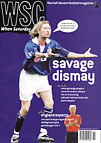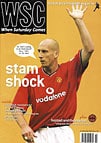 Every club now has a community scheme, but some are much more effective than others. We looked at how two first division clubs have tried to balance ambitions on the field and engagement with their local area. Millwall chairman Theo Paphitis outlines his strategy to Andy Lyons
Every club now has a community scheme, but some are much more effective than others. We looked at how two first division clubs have tried to balance ambitions on the field and engagement with their local area. Millwall chairman Theo Paphitis outlines his strategy to Andy Lyons
Is there a tension between trying to get Millwall into the Premiership and trying to maintain the community programmes the club has established?
No, they go hand in glove. Without the community you haven’t got a football club. The community scheme is about remembering your roots. If we get some success on the playing side along the way then that’s great too, but it shouldn’t happen in a way that prejudices the connection with the community. Without the club funding our community scheme couldn’t operate but it is run separately from the club as a charitable trust. We have just taken on the Lions Centre, which is what used to be the council leisure centre around the corner and that is the hub of our operations. What we’ve got here dedicated to community is probably more than what a lot of people have got dedicated to their entire football club. That’s been key from the day I arrived. It means we can get kids to come to us. Going to schools with a couple of people in club tracksuits giving away a few freebies is fine, but actually geting them here to let them spend a day at the club, see the stadium, see the changing rooms, play on the five-a-side pitches with some professional FA qualified coaches – that’s totally different. Also, it allows us to have classrooms and computer equipment. Football is the key, but we don’t bring them in just to knock a ball about.
